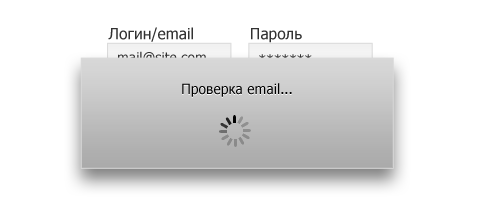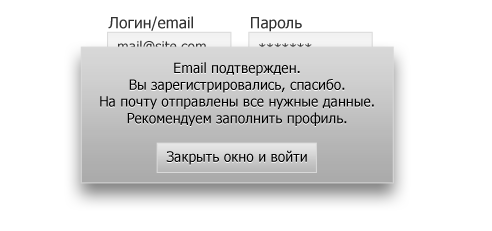Reflections on the topic: the ideal registration form
 I don’t know how useful and / or captain these thoughts are, if you say anything :) But I haven’t seen this anywhere, unfortunately.
I don’t know how useful and / or captain these thoughts are, if you say anything :) But I haven’t seen this anywhere, unfortunately. Falling asleep and reflecting on another idea that would require a helpdesk / bugtracker, I thought: after all, forcing users to go through registration in order to post a bug / feature-quest is inhuman. On the other hand, Anonymous is also not always good. And what to do?
The bottom line is: the ideal form of registration is the login form.
More details and with pictures under the cut.
Algorithm
An unregistered user enters into the login form the data on which he wants to login.

UPD
Habraiser spmbt advises to write "Login or email ... Password (if any)."
Yes, this, perhaps, will make it clear to many that this is also a registration. Plos add a hint when you hover over the part "(if any)" with a pseudo-link.
/ UPD
After which it sees:

Where the last button just closes the notification (the user has sealed up)
The second one flips to the login / password recovery form.
Well, the first, obviously, registers a person.
If you entered not email, but login - ask for email and check it:

(you can still ask a security question or show captcha)
UPD
Validate email by making callout: initiate an smtp connection and reaching rcpt to:
/ UPD
If email is working:

Registration is completed. We close the window and immediately enter the site automatically.
I would be happy if everywhere it was possible to register in this way.
True, the question remains how to make it clear to the guest that registration works just like that (so that he is not afraid of it), and not how he is used to - a bunch of useless fields and jumps between pages with confirmation of registration by clicking on the link in the letter, which is still unknown when ...
UPD
Habrauser rbatoon89 gave a link to a resource where registration is implemented in a similar way, but, perhaps, almost to perfection: gomockingbird.com/mockingbird
UPD2
In the comments, a lot of “dopils” and real examples were born, so be sure to read the comments
